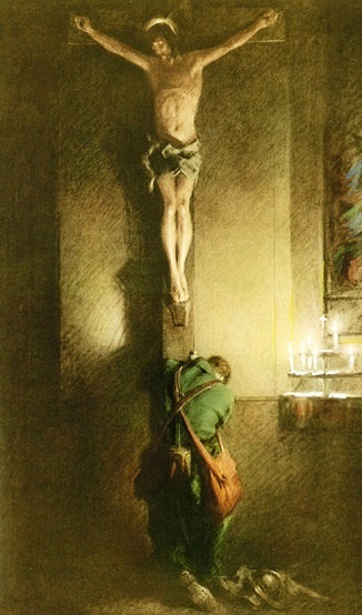Fr Neil’s homily at Mass on the Second Sunday after Trinity (21 June)
Do not fear those who kill the body but cannot kill the soul; rather fear him who can destroy both soul and body in hell.
Fear can so easily plague humanity. It is fear that so often leads to many irrational acts and illogical thinking. This in turn can lead to sin. The fear of the unknown can lead to paralysis and isolation. The fear of shame and humiliation can lead to lies and dishonesty. The fear of those who are different can lead to prejudice and racial stereotypes. The fear of being forgotten can lead to getting into peoples’ faces and being loud, demanding and over bearing. The fear of losing someone or something can lead to jealousy, controlling or smoothing behaviour. The fear of losing control can lead to bullying, domestic violence, unjust trade systems and even international war. This fear in humanity highlights the truth revealed by Paul in his epistle on the state of original sin inherited from Adam. “Sin came into the world through one man and death through sin, and so death spread to all men because all men sinned.” (Rom 5:12) Fear is a symptom of the state of the Fall.
In the gospel our Lord is preparing the disciples to be sent out on mission, like lambs among wolves. They have seen how our Lord was rejected and ill treated by those he sought to address and we know where that would eventually lead — Golgotha. Christ makes it clear that those who are his disciples and followers should expect no less than moments of rejection, ridicule and even martyrdom.
Our Lord speaks directly to the natural fear that the disciples were feeling. While it is perfectly normal to fear death of the body at the hands of others — yet the greater thing we must fear, our Lord reminds us, is the one who can kill both body and soul in Hell. Bodily death is terrible and feared because it is not what was originally meant to be. Death is another separation of that which is meant to be united, our body and soul. Yet bodily death is also a temporal event, in time; something to be passed through which, as a result of the fall, we must all face. The real fear is the death of both body and soul — that death in an eternal ongoing reality for those who have wilfully rejected God.
Logically, which should be feared most? How other people think about us and what they can do to us, or our separation from God and all that might mean for our eternal destiny? The sheer immediacy of the threat posed by others somehow feels more real than the spiritual and eternal death at the Last Judgement: “for nothing is covered that will not be revealed, or hidden that will not be known.”
After all we are born into the state of separation from God because of the fall of Adam. Yet what’s at stake could not be higher.
It was to address this very condition of humanity that Our Lord came, to free us from the reign of evil, sin and death and make possible our reconciliation with God, the Father. Fear of what the implications might be for our lives or relationships, and the changes it may well require, should not impede our embracing of the way of reconciliation with our Lord. Neither should it stop us proclaiming the truth that we have encountered, to an often hostile world. As we bear witness to Christ in what we say and do, so our Lord bears witness to us before our Heavenly Father.Is our Lord however, encouraging a sense of terror of God that can lead us to cringe in a dark corner? Absolutely not — it is not consistent with what he has sought to reveal about his Heavenly Father. This fear that he refers to is a redeeming understanding of fear, which the wisdom sayings in scripture repeatedly refer to: “the fear of the Lord is the beginning of wisdom.” (Prov 1:7, 9:10) It carries the notion of a sense of awe and wonder at the majesty of God in all his wonder. It is a fear that recognises that God’s love for us is so profound that he will respect the choices we made and will not violate our free will.
This redeemed fear is a gift of the Holy Spirit that enables us to fear wounding the one who has loved us and whom we seek to love in return. Anyone who truly loves fears doing something that would hurt the object of their love. It is a healthy fear rooted not in terror but love.
Love motivates us to live the life of faith boldly and not fear what others might say or do. It is love that gives a true fear of the Lord and a sense of utter awe at His wonder and love, that love made manifest as St Paul says, “But the free gift is not like the trespass. For if many died through one man’s trespass, much more have the grace of God and the free gift in the grace of that one man Jesus Christ abounded for many.”
Video via YouTube ![]()








 Posts
Posts